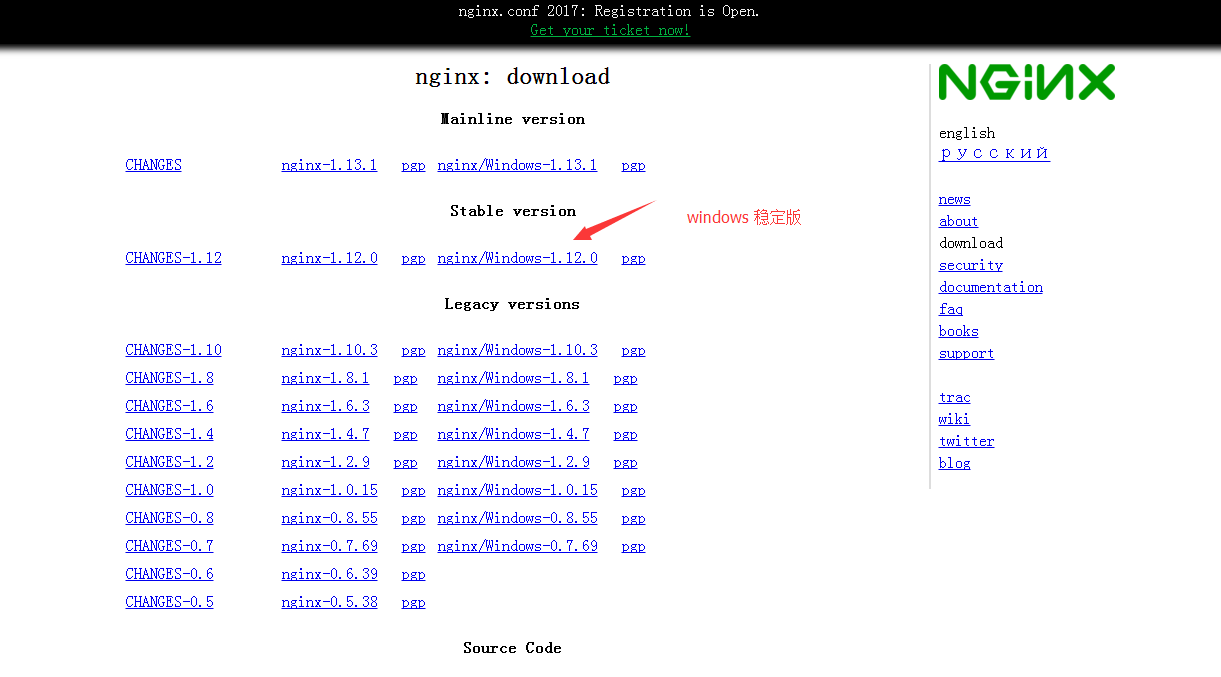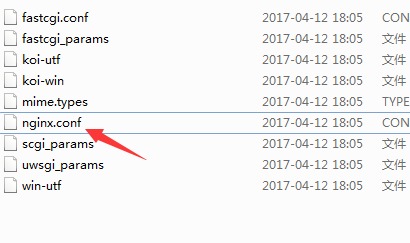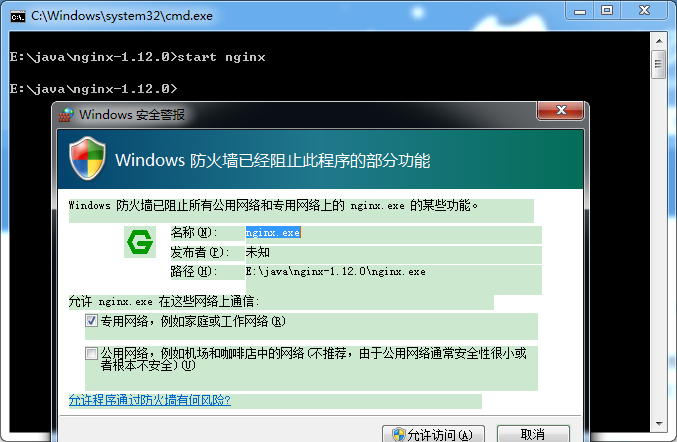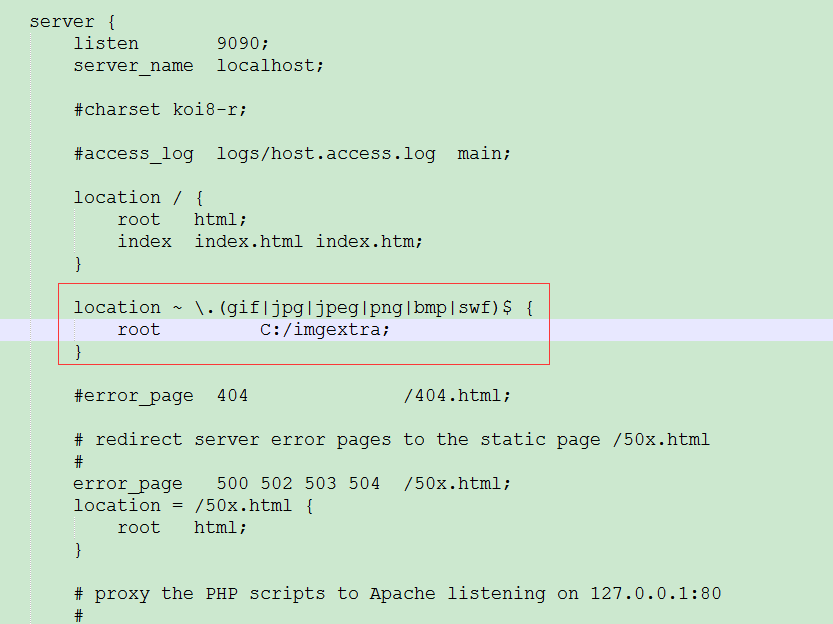Nginx配置详解
序言
Nginx是lgor Sysoev为俄罗斯访问量第二的rambler.ru站点设计开发的。从2004年发布至今,凭借开源的力量,已经接近成熟与完善。
Nginx功能丰富,可作为HTTP服务器,也可作为反向代理服务器,邮件服务器。支持FastCGI、SSL、Virtual Host、URL Rewrite、Gzip等功能。并且支持很多第三方的模块扩展。
Nginx的稳定性、功能集、示例配置文件和低系统资源的消耗让他后来居上,在全球活跃的网站中有12.18%的使用比率,大约为2220万个网站。
牛逼吹的差不多啦,如果你还不过瘾,你可以百度百科或者一些书上找到这样的夸耀,比比皆是。
Nginx常用功能
1、Http代理,反向代理:作为web服务器最常用的功能之一,尤其是反向代理。
这里我给来2张图,对正向代理与反响代理做个诠释,具体细节,大家可以翻阅下资料。

Nginx在做反向代理时,提供性能稳定,并且能够提供配置灵活的转发功能。Nginx可以根据不同的正则匹配,采取不同的转发策略,比如图片文件结尾的走文件服务器,动态页面走web服务器,只要你正则写的没问题,又有相对应的服务器解决方案,你就可以随心所欲的玩。并且Nginx对返回结果进行错误页跳转,异常判断等。如果被分发的服务器存在异常,他可以将请求重新转发给另外一台服务器,然后自动去除异常服务器。
2、负载均衡
Nginx提供的负载均衡策略有2种:内置策略和扩展策略。内置策略为轮询,加权轮询,Ip hash。扩展策略,就天马行空,只有你想不到的没有他做不到的啦,你可以参照所有的负载均衡算法,给他一一找出来做下实现。
上3个图,理解这三种负载均衡算法的实现

Ip hash算法,对客户端请求的ip进行hash操作,然后根据hash结果将同一个客户端ip的请求分发给同一台服务器进行处理,可以解决session不共享的问题。 
3、web缓存
Nginx可以对不同的文件做不同的缓存处理,配置灵活,并且支持FastCGI_Cache,主要用于对FastCGI的动态程序进行缓存。配合着第三方的ngx_cache_purge,对制定的URL缓存内容可以的进行增删管理。
4、Nginx相关地址
源码:https://trac.nginx.org/nginx/browser
官网:http://www.nginx.org/
Nginx配置文件结构
如果你下载好啦,你的安装文件,不妨打开conf文件夹的nginx.conf文件,Nginx服务器的基础配置,默认的配置也存放在此。
在nginx.conf的注释符号位#
nginx文件的结构,这个对刚入门的同学,可以多看两眼。
默认的config
 View Code
View Codenginx文件结构
... #全局块
events { #events块
...
}
http #http块
{
... #http全局块
server #server块
{
... #server全局块
location [PATTERN] #location块
{
...
}
location [PATTERN]
{
...
}
}
server
{
...
}
... #http全局块
}
1、全局块:配置影响nginx全局的指令。一般有运行nginx服务器的用户组,nginx进程pid存放路径,日志存放路径,配置文件引入,允许生成worker process数等。
2、events块:配置影响nginx服务器或与用户的网络连接。有每个进程的最大连接数,选取哪种事件驱动模型处理连接请求,是否允许同时接受多个网路连接,开启多个网络连接序列化等。
3、http块:可以嵌套多个server,配置代理,缓存,日志定义等绝大多数功能和第三方模块的配置。如文件引入,mime-type定义,日志自定义,是否使用sendfile传输文件,连接超时时间,单连接请求数等。
4、server块:配置虚拟主机的相关参数,一个http中可以有多个server。
5、location块:配置请求的路由,以及各种页面的处理情况。
下面给大家上一个配置文件,作为理解,同时也配入我搭建的一台测试机中,给大家示例。
########### 每个指令必须有分号结束。#################
#user administrator administrators; #配置用户或者组,默认为nobody nobody。
#worker_processes 2; #允许生成的进程数,默认为1
#pid /nginx/pid/nginx.pid; #指定nginx进程运行文件存放地址
error_log log/error.log debug; #制定日志路径,级别。这个设置可以放入全局块,http块,server块,级别以此为:debug|info|notice|warn|error|crit|alert|emerg
events {
accept_mutex on; #设置网路连接序列化,防止惊群现象发生,默认为on
multi_accept on; #设置一个进程是否同时接受多个网络连接,默认为off
#use epoll; #事件驱动模型,select|poll|kqueue|epoll|resig|/dev/poll|eventport
worker_connections 1024; #最大连接数,默认为512
}
http {
include mime.types; #文件扩展名与文件类型映射表
default_type application/octet-stream; #默认文件类型,默认为text/plain
#access_log off; #取消服务日志
log_format myFormat '$remote_addr–$remote_user [$time_local] $request $status $body_bytes_sent $http_referer $http_user_agent $http_x_forwarded_for'; #自定义格式
access_log log/access.log myFormat; #combined为日志格式的默认值
sendfile on; #允许sendfile方式传输文件,默认为off,可以在http块,server块,location块。
sendfile_max_chunk 100k; #每个进程每次调用传输数量不能大于设定的值,默认为0,即不设上限。
keepalive_timeout 65; #连接超时时间,默认为75s,可以在http,server,location块。
upstream mysvr {
server 127.0.0.1:7878;
server 192.168.10.121:3333 backup; #热备
}
error_page 404 https://www.baidu.com; #错误页
server {
keepalive_requests 120; #单连接请求上限次数。
listen 4545; #监听端口
server_name 127.0.0.1; #监听地址
location ~*^.+$ { #请求的url过滤,正则匹配,~为区分大小写,~*为不区分大小写。
#root path; #根目录
#index vv.txt; #设置默认页
proxy_pass http://mysvr; #请求转向mysvr 定义的服务器列表
deny 127.0.0.1; #拒绝的ip
allow 172.18.5.54; #允许的ip
}
}
}
上面是nginx的基本配置,需要注意的有以下几点:
1、1.$remote_addr 与$http_x_forwarded_for 用以记录客户端的ip地址; 2.$remote_user :用来记录客户端用户名称; 3.$time_local : 用来记录访问时间与时区;4.$request : 用来记录请求的url与http协议;
5.$status : 用来记录请求状态;成功是200, 6.$body_bytes_s ent :记录发送给客户端文件主体内容大小;7.$http_referer :用来记录从那个页面链接访问过来的; 8.$http_user_agent :记录客户端浏览器的相关信息;
2、惊群现象:一个网路连接到来,多个睡眠的进程被同事叫醒,但只有一个进程能获得链接,这样会影响系统性能。
3、每个指令必须有分号结束。
nginx+ftp搭建图片服务器(Windows Server服务器环境下)

start nginx //启动nginxnginx -s stop // 停止nginxnginx -s reload // 重新加载配置文件nginx -s quit // 退出nginxnginx -t //检查配置文件是否正确



|
1
2
3
4
|
location ~ \.(gif|jpg|jpeg|png|bmp|swf)$ { #默认的图片路径,也是ftp上传文件存放的路径,只要后缀是以上的都会到这个路径下搜索 root C:/imgextra; } |



windows下用nginx配置https服务器
1.安装nginx
- 先到
nginx官网下在nginxhttp://nginx.org/en/download.html

- 将下载好的文件解压出来修改文件名为 nginx ,然后拷贝到C盘下,目录如下:

- 运行 nginx
start nginx
- 验证
在浏览器中输入 localhost 访问即可,如出现以下页面,即安装成功

2.安装 OpenSSL
-
下载完成安装到
C:\OpenSSL-Win64 -
配置环境变量

在path变量后需要加入 %OPENSSL_HOME%

3.生成https证书
- 在C:\nginx下创建ssl文件夹 用于存放证书
- 创建私钥 (建议使用系统窗口,不要用gitBash 有涉及到选择的地方,gitBash无法选择)
openssl genrsa -des3 -out shidian.key 1024 //shidian 自己取的名字
效果如下:


- 创建 csr 证书
openssl req -new -key shidian.key -out shidian.csr

此时效果:

- 删除密码
复制shidian.key并重命名shidian.key.org
openssl rsa -in shidian.key.org -out shidian.key

- 生成crt证书
openssl x509 -req -days 365 -in shidian.csr -signkey shidian.key -out shidian.crt

- 最后生成证书如下

修改 nginx 下的 nginx.conf配置文件
C:\nginx\conf\nginx.conf
upstream nodejs__upstream2 {
server 127.0.0.1:8080; # 需要监听的端口名 我用的
keepalive 64;
}
server {
listen 443 ssl;
server_name dev.kt.looklook.cn; # 配置的https的域名
ssl_certificate C://nginx//ssl//shidian.crt; # 这个是证书的crt文件所在目录
ssl_certificate_key C://nginx//ssl//shidian.key; # 这个是证书key文件所在目录
ssl_session_cache shared:SSL:1m;
ssl_session_timeout 5m;
ssl_ciphers HIGH:!aNULL:!MD5;
ssl_prefer_server_ciphers on;
location / {
proxy_set_header X-Real-IP $remote_addr;
proxy_set_header X-Forwarded-For $proxy_add_x_forwarded_for;
proxy_set_header Host $http_host;
proxy_set_header X-NginX-Proxy true;
proxy_set_header Connection "";
proxy_http_version 1.1;
proxy_pass http://nodejs__upstream2;
}
}
- 重启nginx
nginx -s reload
- 配置host文件
C:\Windows\System32\drivers\etc 路径下
127.0.0.1 dev.kt.looklook.cn #需要配置的域名
- 访问
输入你配置好的域名即可访问了
Nginx httpS server配置
Nginx httpS 配置
配置同时支持http和httpS协议:
server { listen 80 default backlog=2048;
#backlog:每个网络接口接收数据包的速率比内核处理这些包的速率快时,允许送到队列的数据包的最大数目。 listen 443 ssl; server_name ssl.joy4you.com; ssl_certificate /data/nginx/conf/server.crt; ssl_certificate_key /data/nginx/conf/server_nopwd.key; root /data/; location / { index index.php index.html index.htm; try_files $uri $uri/ /index.php?$args; } location ~ .*\.(php|php5)?$ { # try_files $uri =404; fastcgi_pass 127.0.0.1:9000; fastcgi_index index.php; # fastcgi_param SCRIPT_FILENAME $document_root$fastcgi_script_name; include fastcgi.conf; } }
配置/data/http/使用http协议;/data/ssl/使用httpS协议:
server { listen 80; server_name 192.168.17.16; access_log /data/nginx/logs/php.joy4you.com.log main; root /data/http/; location / { index index.php index.html index.htm; try_files $uri $uri/ /index.php?$args; } location ~ .*\.(php|php5)?$ { # try_files $uri =404; fastcgi_pass 127.0.0.1:9000; fastcgi_index index.php; # fastcgi_param SCRIPT_FILENAME $document_root$fastcgi_script_name; include fastcgi.conf; } } server { listen 443; ssl on; ssl_certificate /data/nginx/conf/server.crt; ssl_certificate_key /data/nginx/conf/server_nopwd.key; server_name 192.168.17.16; access_log /data/nginx/logs/php.joy4you.com.log main; root /data/ssl/; location / { index index.php index.html index.htm; try_files $uri $uri/ /index.php?$args; } location ~ .*\.(php|php5)?$ { # try_files $uri =404; fastcgi_pass 127.0.0.1:9000; fastcgi_index index.php; # fastcgi_param SCRIPT_FILENAME $document_root$fastcgi_script_name; include fastcgi.conf; } }
把访问80端口的请求全部转发到443(https):
server { listen 80; server_name 192.168.17.16; rewrite ^(.*) https://$server_name$1 permanent; } server { listen 443; ssl on; ssl_certificate /data/nginx/conf/server.crt; ssl_certificate_key /data/nginx/conf/server_nopwd.key; server_name 192.168.17.16; access_log /data/nginx/logs/php.joy4you.com.log main; root /data/; location / { index index.php index.html index.htm; try_files $uri $uri/ /index.php?$args; } location ~ .*\.(php|php5)?$ { # try_files $uri =404; fastcgi_pass 127.0.0.1:9000; fastcgi_index index.php; # fastcgi_param SCRIPT_FILENAME $document_root$fastcgi_script_name; include fastcgi.conf; } }
使用沃通的CA证书,他们推荐的https配置:
server {
listen 443;
server_name localhost;
#为一个server开启ssl支持
ssl on;
#为虚拟主机指定pem格式的证书文件
ssl_certificate /home/wangzhengyi/ssl/wangzhengyi.crt;
#为虚拟主机指定私钥文件
ssl_certificate_key /home/wangzhengyi/ssl/wangzhengyi_nopass.key;
#客户端能够重复使用存储在缓存中的会话参数时间
ssl_session_timeout 5m;
#指定使用的ssl协议
ssl_protocols TLSv1 TLSv1.1 TLSv1.2;
#指定许可的密码描述
ssl_ciphers ALL:!ADH:!EXPORT56: -RC4+RSA:+HIGH:+MEDIUM: !EXP;
#ssl_ciphers ALL:!ADH:!EXPORT56: -RC4+RSA:+HIGH:+MEDIUM:-EXP;
#SSLv3和TLSv1协议的服务器密码需求优先级高于客户端密码
ssl_prefer_server_ciphers on;
SLL参数:
ssl_session_timeout 5m; ##设置客户端能够反复使用储存在缓存中的会话参数时间。
ssl_protocols TLSv1 TLSv1.1 TLSv1.2; ##指定要开启的SSL协议。
ssl_ciphers ALL:!ADH:!EXPORT56:-RC4+RSA:+HIGH:+MEDIUM:!EXP; ##指出为建立安全连接,服务器所允许的密码格式列表,密码指定为OpenSSL支持的格式
ssl_prefer_server_ciphers on; ##依赖SSLv3和TLSv1协议的服务器密码将优先于客户端密码.

